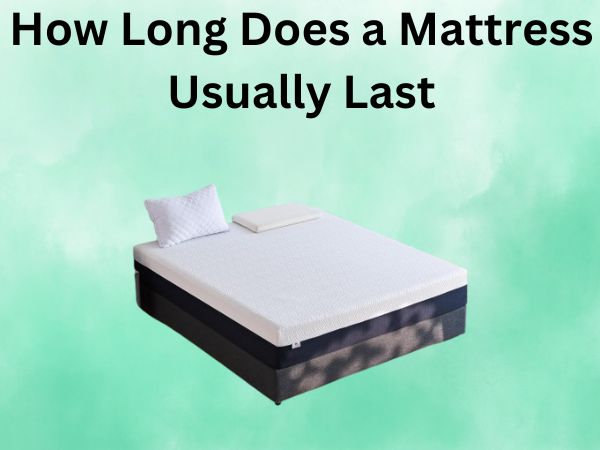How Long Does a Mattress Usually Last?
Have you ever wondered how long your mattress is supposed to last? It’s an important question, as a quality mattress is a significant investment for most people. After all, we spend around a third of our lives sleeping, so it’s crucial to have a comfortable and supportive mattress that can stand the test of time.
The truth is, there’s no simple answer to the question of mattress lifespan. The expected lifetime of a mattress can vary quite a bit depending on several factors. In this article, we’ll explore the average mattress lifespan, the signs that it’s time to replace your mattress, and some tips to help your mattress last as long as possible.
What is the Average Mattress Lifespan?
According to most experts, the average mattress should last somewhere between 7 and 10 years. This is a general guideline, but the actual lifespan of your mattress can be influenced by several key factors:
- Mattress Type: Different mattress materials and construction methods have varying durability. For example, high-quality memory foam and innerspring mattresses tend to last longer than lower-quality foam mattresses.
- Usage and Care: How often you use the mattress, as well as how you care for it (e.g., rotating it regularly, using a mattress protector), can impact its longevity.
- Your Body Weight: Heavier sleepers tend to wear down a mattress more quickly than lighter sleepers.
- Sleep Quality: If you’re waking up with aches and pains, it may be a sign that your mattress is no longer providing the support and comfort it once did.
It’s important to note that the lifespan of a mattress can also vary depending on the type of mattress. For example, innerspring mattresses may last 7-10 years, while higher-quality memory foam or hybrid mattresses can last up to 10-12 years with proper care.
Signs It’s Time to Replace Your Mattress
Even if you can’t pinpoint the exact age of your mattress, there are several telltale signs that it’s time for a replacement:
1. Sagging or Indentations
Over time, the materials in your mattress will start to break down, leading to sagging or indentations where you sleep. This can cause a lack of support and lead to pain or discomfort.
2. Decreased Comfort and Support
As a mattress ages, it naturally becomes less comfortable and supportive. If you find yourself tossing and turning more at night or waking up with aches and pains, it may be time for a new mattress.
3. Visible Wear and Tear
Look for signs of physical damage, such as rips, tears, or exposed coils. These are clear indications that your mattress has reached the end of its lifespan.
4. Allergies or Odors
Older mattresses can accumulate dust mites, mold, and other allergens that can trigger respiratory issues or unpleasant odors. If you notice either of these problems, it’s time for a replacement.
Tips to Extend Your Mattress Lifespan
While the average mattress lifespan is 7-10 years, there are several steps you can take to help your mattress last as long as possible:
1. Use a Mattress Protector
Investing in a high-quality mattress protector can help shield your mattress from spills, stains, and other forms of damage, prolonging its overall lifespan.
2. Rotate Your Mattress Regularly
Most experts recommend rotating your mattress every 3-6 months to help distribute wear and tear evenly. This can prevent premature sagging or indentations.
3. Avoid Jumping on the Bed
While it may be tempting to use your mattress as a trampoline, excessive bouncing and jumping can break down the internal components more quickly.
4. Maintain a Consistent Mattress Temperature
Extreme temperature changes, such as leaving your mattress in direct sunlight or near a heat source, can cause the materials to break down faster.
5. Consider a Mattress Topper
Adding a high-quality mattress topper can provide an extra layer of comfort and support, helping to extend the life of your existing mattress.
Conclusion
The average mattress lifespan is typically between 7-10 years, but the exact timeline can vary depending on factors like mattress type, usage, and care. By being mindful of the signs that it’s time for a replacement and taking steps to properly maintain your mattress, you can help ensure that you get the most out of your investment and enjoy a restful, comfortable sleep for years to come.
FAQ
How can I tell if my mattress needs to be replaced?
Some key signs that it’s time to replace your mattress include sagging or indentations, decreased comfort and support, visible wear and tear, and the presence of allergens or odors.
What is the average lifespan of a memory foam mattress?
Memory foam mattresses typically last around 10-12 years with proper care and maintenance. They tend to be more durable than lower-quality foam mattresses.
How often should I rotate my mattress?
Most experts recommend rotating your mattress every 3-6 months to help distribute wear and tear evenly and prevent premature sagging or indentations.
Can a mattress topper extend the life of my mattress?
Yes, adding a high-quality mattress topper can provide an extra layer of comfort and support, helping to extend the overall lifespan of your existing mattress.
What’s the best way to store a mattress when not in use?
If you need to store a mattress, it’s important to keep it in a cool, dry place and avoid exposing it to direct sunlight or excessive heat, which can cause the materials to break down more quickly.


![5 Best Foam Mattress Topper for Back Pain [In 2025]](https://homeunderstandable.com/wp-content/uploads/2025/08/Best-Foam-Mattress-Topper-for-Back-Pain.jpg)
![What Is The Best Mattress for 230 lb Man [In 2026]](https://homeunderstandable.com/wp-content/uploads/2025/11/Best-Mattress-for-230-lb-Man.jpg)
![What Is The Best Pillow for Memory Foam Mattress [In 2025]](https://homeunderstandable.com/wp-content/uploads/2025/08/Best-Pillow-for-Memory-Foam-Mattress.jpg)
![What Is The Best Budget Air Mattress for Camping [In 2025]](https://homeunderstandable.com/wp-content/uploads/2025/06/best-budget-air-mattress-for-camping.jpg)